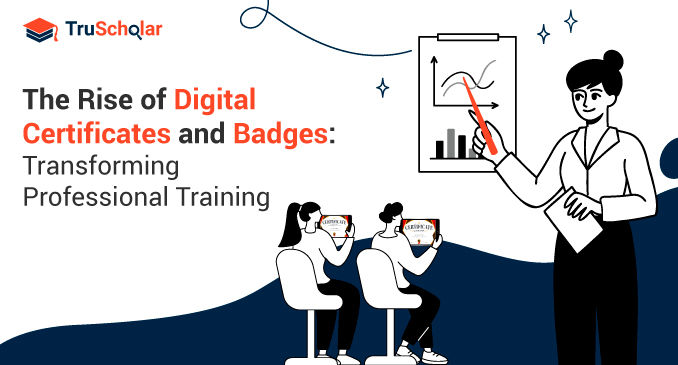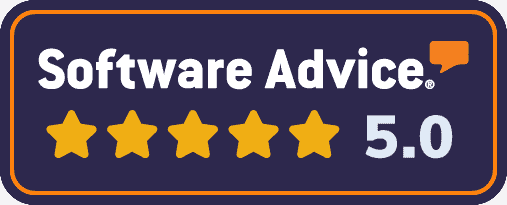In today’s rapidly evolving professional landscape, the importance of continuous training and development cannot be overstated. It is the key to staying competitive and relevant in a world where skills are constantly changing. As traditional credentials are gradually being phased out, digital certificates in professional training are emerging as the new standard for showcasing and validating professional achievements.
Digital certificates and badges are electronic credentials that serve as verifiable proof of an individual’s skills, accomplishments, and qualifications. Unlike their physical counterparts, these digital credentials offer enhanced credibility, accessibility, and real-time verification. They are revolutionizing the way we perceive professional training and are reshaping the hiring process. Let’s delve deeper into the transformative power of digital certificates in professional traininig.
The Benefits of Digital Certificates and Badges in Professional Training
A. Enhanced Credibility and Trust
One of the significant advantages of digital certificates in professional training is their ability to enhance credibility and build trust among employers, academic institutions, and industry peers. These credentials are often issued by reputable organizations and come with built-in verification mechanisms. This means that employers can easily verify the authenticity of the credentials, eliminating the risk of fraudulent or counterfeit certificates.
Moreover, digital credentials offer increased transparency and accountability in the hiring process. Hiring managers can now make more informed decisions by assessing the specific skills and competencies acquired by candidates through the detailed information embedded within these credentials. This enables organizations to identify the most suitable candidates based on verified skills, leading to more efficient and effective talent acquisition.
B. Improved Accessibility and Portability
Digital certificates and badges provide unprecedented accessibility and portability for professionals. Unlike traditional paper-based credentials, digital certificates and badges can be easily accessed and shared online. This convenience allows individuals to showcase their achievements to potential employers or clients from anywhere in the world.
Furthermore, digital credentials are compatible across various platforms and devices, ensuring seamless integration and display. Whether it’s a desktop computer, a smartphone, or a professional networking platform, individuals can confidently present their digital credentials in a consistent and professional manner. This enhances their digital presence and makes it easier for employers and industry peers to engage with their professional profile.
C. Real-time Verification and Validation
Gone are the days of lengthy verification procedures and manual checks. With digital certificates and badges, verification and validation are instant and hassle-free. Employers and academic institutions can quickly verify the authenticity of these credentials, thanks to advanced technological advancements such as blockchain integration.
Blockchain technology provides a secure and tamper-proof verification process. By leveraging the decentralized nature of blockchain, digital certificates and badges are resistant to alteration or falsification. This ensures the integrity of the credentials and enhances trust in the verification process. With real-time verification, employers can expedite the hiring process, making it more efficient for both parties involved.
D. Enhanced Skill Visibility and Recognition
Digital certificates and badges offer a level of skill visibility and recognition that surpasses traditional credentials. Within these digital credentials, specific skills and competencies are meticulously documented, providing a comprehensive overview of an individual’s capabilities.
Moreover, digital credentials enable increased recognition and validation of niche or emerging skills. As industries rapidly evolve, certain skills become more sought after than others. With digital badges and certificates, professionals can highlight their proficiency in these specialized areas, making them more attractive to employers and opening up new opportunities for career growth.
E. Lifelong Learning and Continuous Professional Development
Digital certificates and badges actively promote lifelong learning and continuous professional development. They serve as incentives for individuals to acquire new skills and expand their knowledge in a structured manner. By offering micro-credentials, which represent bite-sized learning experiences, professionals can engage in ongoing learning while focusing on specific areas of interest or immediate career needs.
These digital credentials also encourage professionals to stay up to date with the latest industry trends and best practices. As they earn new badges and certificates, individuals gain recognition for their commitment to continuous improvement. This culture of lifelong learning is essential for staying competitive in a rapidly changing professional landscape.
The Role of Digital Certificates and Badges in Various Industries
A. Information Technology Sector
In the information technology sector, digital certificates and badges play a crucial role in validating specific programming languages or software certifications. As the demand for IT professionals continues to rise, these credentials provide a standardized and verifiable way to assess an individual’s technical skills. Digital badges are also particularly relevant in cybersecurity, where professionals can showcase their expertise in securing digital assets and protecting against cyber threats. Additionally, industry-specific certifications for cloud computing or data analytics are becoming increasingly prevalent, enabling professionals to demonstrate their proficiency in these specialized areas.
B. Healthcare and Medical Field
In the healthcare and medical field, digital certificates and badges have revolutionized the validation of licenses and certifications. These credentials serve as concrete evidence of a healthcare professional’s qualifications, ensuring compliance with regulatory requirements. Specialized digital badges for advanced medical procedures or specialties offer a way for professionals to showcase their expertise and stand out in a highly competitive industry. Moreover, the integration of digital certificates with electronic health records and patient care systems streamlines administrative processes and improves the overall efficiency of healthcare delivery.
C. Education and Training Industry
The education and training industry has also embraced digital certificates and badges as a means of recognizing and validating professional development and training programs. Teachers can earn digital certificates for completing professional development courses, which demonstrate their commitment to improving their teaching practices. Badges for educational technology skills and innovative teaching practices provide educators with opportunities to showcase their expertise in integrating technology into the classroom. Moreover, specialized education degrees or certifications can be validated through digital credentials, offering professionals in the education field a way to stand out in a crowded job market.
D. Creative and Design Fields
Digital certificates and badges have made a significant impact on the creative and design fields, where traditional portfolios may not fully capture an individual’s skills. Graphic designers, web developers, and UX/UI professionals can now showcase their expertise through digital badges that validate their specific skill sets. Certifications for digital marketing or social media management offer professionals in these fields a way to demonstrate their proficiency in driving online engagement and business growth.
Additionally, portfolio-based digital certificates provide validation for creative skills, enabling professionals to showcase their talent in a visually compelling manner.
Implementation Challenges and Potential Solutions
A. Standardization and Interoperability Issues
Despite the numerous benefits of digital certificates and badges, challenges related to standardization and interoperability remain. There is currently a lack of universally accepted standards for these credentials, leading to fragmented systems and inconsistencies across platforms. To address this challenge, initiatives such as Open Badges by Mozilla and IMS Global are working towards establishing industry-wide standards. These efforts aim to ensure that digital credentials can be seamlessly shared and validated across platforms, regardless of the issuing organization or technology used.
B. Security and Privacy Concerns
With the increasing reliance on digital credentials, security and privacy concerns have become paramount. Risks such as data breaches, identity theft, and falsification of digital credentials pose significant challenges to the widespread adoption of these credentials. However, steps have been taken to ensure secure storage and transmission of digital certificates. Encryption technologies, secure storage protocols, and compliance with data protection regulations, such as GDPR and CCPA, are being implemented to safeguard the integrity and privacy of these credentials.
C. Adoption and Acceptance by Employers and Institutions
For digital certificates and badges to realize their full potential, widespread adoption and acceptance by employers and institutions are crucial. Many organizations are still unaware of the value and benefits associated with these credentials. Therefore, collaboration between educational institutions, industry stakeholders, and professional organizations is essential to promote the adoption
and recognition of digital credentials. Initiatives such as awareness campaigns, educational workshops, and partnerships between universities and industry leaders can help raise awareness about the value of digital certificates and badges. Incentives can also be introduced to encourage employers to consider these credentials during the hiring process, such as preferential treatment or additional recognition for candidates with verified digital credentials.
Future Trends and Opportunities
A. Integration of Artificial Intelligence and Machine Learning
As technology continues to advance, the integration of artificial intelligence (AI) and machine learning (ML) holds great potential for the future of digital certificates and badges. AI-powered algorithms can analyze candidates’ skills and match them with job requirements, enabling more precise talent matching and reducing the time and effort spent on manual screening. Intelligent recommendation systems can provide personalized professional development paths based on individuals’ existing skills and career aspirations. Furthermore, automation can streamline the verification and validation process, making it faster and more efficient for employers and institutions.
B. Global Recognition and Portability of Digital Credentials
Efforts are underway to establish international standards for cross-border recognition of digital certificates, ensuring their global recognition and portability. The development of digital credentialing platforms that comply with these standards will enable professionals to seamlessly present their credentials across countries and regions, eliminating barriers to employment and career mobility. Collaboration between governments, international organizations, and industry bodies is essential to establish trust in digital credentials and create a globally recognized ecosystem.
C. Gamification and Badge Ecosystems
To enhance engagement and motivation, gamification elements can be integrated into the digital credentialing process. Gamified features such as progress tracking, levels, and rewards can make learning and skill development more enjoyable and encourage individuals to pursue further educational opportunities. Additionally, the creation of badge ecosystems, where individuals can earn, display, and share their accomplishments, fosters a sense of pride and community among professionals. These ecosystems can also serve as platforms where badges can be utilized as currency, granting access to advanced educational programs or career advancement opportunities.
Conclusion
Digital certificates and badges are transforming professional training by providing enhanced credibility, accessibility, and recognition. The benefits they offer, such as improved trust, real-time verification, and enhanced skill visibility, are reshaping the way professionals showcase their qualifications and employers identify top talent. Despite implementation challenges, initiatives are being taken to address standardization, security, and adoption concerns.
Looking ahead, the integration of AI and ML, the global recognition and portability of digital credentials, and the development of gamified badge ecosystems offer exciting opportunities for the future of professional training. It is essential for individuals and organizations to embrace this rising trend and leverage digital certificates and badges to facilitate lifelong learning, continuous professional development, and a skilled workforce that thrives in an ever-evolving professional landscape.
Are you ready to revolutionize your professional training and enhance your career prospects? Discover the power of digital certificates and badges in transforming your skillset and validating your achievements. With greater accessibility, tamper-proof authenticity, and enhanced visibility, digital credentials showcase your expertise in a verifiable and shareable manner. Gain a competitive edge in the job market and bridge the skills gap with credentials that align with specific learning outcomes. Embrace the future of professional training with digital certificates and badges, and unlock endless possibilities for career advancement. Take the first step towards your digital credentialing journey today!
Contact us for more information: https://www.truscholar.io/contact-us/






